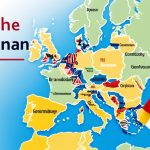Starting a business in Portugal is exciting. UK businesses must choose between a branch or subsidiary. Each option has different implications for operation, law, and finances.
Choosing wisely between a branch or subsidiary can shape our success in Portugal. This decision is key for companies wanting to thrive in the vibrant Portuguese market.
Understanding Business Structures in Portugal
When looking into business structures in Portugal, knowing our options is key. We mainly focus on branches and subsidiaries. Each choice has its own benefits and implications for how we run things.
What is a Branch?
A branch acts as an extension of a foreign company. It goes by the company’s name and isn’t seen as a separate entity. This means the parent company is fully responsible for the branch, including any debts or legal issues.
What is a Subsidiary?
On the other hand, a subsidiary is a company that’s legally its own in Portugal. It might be completely or partly owned by a parent company. Being independent, it has more freedom in making decisions and managing operations.
Key Differences Between Branches and Subsidiaries
Knowing the main differences between these structures is vital for making choices. Here are some important ones:
- Liability: A branch means the parent company faces any liabilities directly. A subsidiary, however, keeps liability limited.
- Taxation: Branches and subsidiaries face different tax rules. Subsidiaries are taxed like local firms.
- Control: Subsidiaries have more freedom to adjust to local market needs without the parent company’s close watch.
Benefits of Starting a Branch in Portugal
Starting a branch in Portugal brings several benefits that boost our business. These advantages go beyond just location. They allow us to connect with the local market and increase our presence. Let’s look at some of the key benefits of this setup.
Simplified Taxation
The tax system for a branch in Portugal is often simpler. It is taxed on the income it makes in Portugal. This simplicity helps us avoid the complex tax issues subsidiaries face. We can then grow our business without worrying too much about tax laws.
Operational Flexibility
Operational flexibility in Portugal is a big plus for a branch. It lets us quickly adapt to market changes. This means we can meet customer needs faster and take up new chances. This flexibility gives us a competitive advantage in the lively Portuguese market.
Less Administrative Burden
A branch also faces fewer administrative hurdles. It’s generally easier to set up than a subsidiary. This means we can focus more on what our business does best. With less paperwork, our resources go further towards our main goals.
Advantages of Establishing a Subsidiary
Setting up a subsidiary brings several key benefits to the table. One major advantage is the enhanced protection against liability. This means the parent company faces less financial risk. It lets us take part in local markets while keeping our main assets safe.
Enhanced Liability Protection
A subsidiary is a separate legal entity. This keeps the parent company safe from any debts or legal issues the subsidiary might face. It’s crucial for reducing risks and keeping our business strong.
Greater Local Integration
Creating a subsidiary helps us bond more with the local community. It boosts our brand and builds loyalty among customers. Getting closer to the market helps us meet local needs better, making our products and services more fitting.
Easier Access to Funding
Subsidiaries often find it easier to get funding. Local backers and banks usually prefer to invest in companies that are part of their community. This makes it easier for us to find money for growth, tapping into local market opportunities.
Key Considerations When Choosing a Structure
Setting up a business in Portugal involves thinking about several key factors. It’s critical to understand the legal and tax implications in Portugal. By doing this, we can ensure our decisions help us reach our business goals.
Legal Obligations
In Portugal, legal requirements differ for branches and subsidiaries. Branches may have fewer administrative tasks, but must still follow local rules closely. Subsidiaries, however, face bigger legal duties like corporate governance. Knowing these rules well is important for our business to run smoothly.
Tax Implications
The tax situation is also important when choosing a business structure. Branches might enjoy simpler taxes, but subsidiaries are taxed differently. We need to check local taxes, including possible benefits, to choose the best option for us.
Business Goals and Strategy
Our long-term aims and strategy also affect our structure choice. Wanting quick growth might mean starting a subsidiary is better. However, if flexibility is key, a branch might be more suitable. Mixing our goals with knowledge of Portugal’s laws and taxes will help pick the right structure.
Step-by-Step Guide to Setting Up a Branch
Starting a branch in Portugal is simple with a clear plan. We will look at each step, from initial research, registering, to gathering needed documents for branches. This makes starting our new branch smooth.
Initial Research and Feasibility Study
The first thing to do is detailed research and a feasibility study. This means:
- Looking at the market situation
- Finding possible challenges
- Checking out the competition in the industry
This info helps us see if our branch can be successful and guides our next steps.
Registration Process
The registration process is key for our business. We need to work with local officials and follow the rules, including:
- Filling in the application for branch registration
- Getting a tax number
- Signing up with the Portuguese Business Registry
Doing these steps means our branch is legal in Portugal.
Required Documentation
We need certain documents to register our branch. Important documents include:
- A certificate of the company’s legal status
- A detailed business plan
- ID for the company’s reps
Having these ready helps the registration go smoothly and keeps us in line with laws.
Setting Up a Subsidiary: A Comprehensive Approach
Starting a subsidiary in Portugal means you must grasp local rules well. This insight helps comply with laws and run smoothly. It also means picking the best location can grow our client base.
Understanding Local Laws and Regulations
Navigating Portugal’s complex company laws is key to doing well. The legal needs vary with the kind of business you’re starting. Getting advice from Portuguese legal experts helps dodge establishment issues.
Choosing the Right Location
The place where we set up will affect how well we operate and reach our market. Consideration should be given to how close suppliers and customers are, and what competitors are nearby. By doing deep research, we’ll find the best spot for our business.
Crucial Documentation Needed
To set up a subsidiary, certain documents are a must. You need:
- Corporate by-laws that show how the subsidiary is structured and governed
- Evidence of financial health
- Tax IDs for legal operations
Having the right paperwork makes the setup smoother and meets legal demands.
Taxation for Branches and Subsidiaries
When we look at business setups in Portugal, it’s key to get the tax part right. We should know how taxes work for branches and subsidiaries. This knowledge helps us make smart financial choices.
Corporate Tax Rates in Portugal
The corporate tax is 21% in Portugal. This is important for both branches and subsidiaries. But, branches have some differences in how they’re taxed, based on their income. They usually have simpler rules, affecting how we plan their taxes.
Value Added Tax (VAT) Considerations
VAT is also a big part of our financial planning. Portugal has a main VAT rate of 23%. But, there are lower rates of 6% and 13% for some items and services. It’s vital to understand VAT for each business type we’re considering. This affects how we set prices and manage costs, especially for businesses we start in Portugal. We need to think about how VAT impacts our returns and what deductions we can get.
Labour Laws and Staffing in Portugal
In Portugal, understanding the labour laws is key. This includes knowing how to manage staff for branches and subsidiaries. It’s crucial for both legal compliance and effective staffing.
Employment Regulations for Branches
Branches in Portugal have to stick to specific rules about worker rights and what employers must do. Important points include:
- Employment contracts should be clear, making sure both sides know what’s expected.
- Social security payments are a must, and they come out of what employees earn.
- Keeping the workplace safe is required by law, making sure all employees are safe at work.
Rules for Subsidiaries Regarding Staff
Subsidiaries have extra rules to follow, like:
- Employment agreements need to match local laws, showing workers’ rights in Portugal.
- They must report taxes and social security accurately, making sure all employees are covered.
- Their company policies should respect local labour laws, creating a workplace that understands local culture.
Networking and Building Relationships in Portugal
Creating strong local links is key in Portugal’s business landscape. Networking there helps us form business relationships, boosting our success chances in this lively market. By connecting with local firms, we get valuable insights, work together on projects, and lay a strong base for our business.
The Importance of Local Connections
Linking up with local companies does more than just deepen our understanding of cultural differences. It also opens up access to critical resources and networks. These bonds offer support, advice, and the chance to form key partnerships. They help us navigate the Portuguese business scene, driving our growth and ensuring we last in the long run.
Key Networking Events and Platforms
We need to engage in certain events and platforms to boost our networking. Here are vital opportunities to consider:
- Business expos and trade fairs, ideal for showcasing our products and finding new clients.
- Events by chambers of commerce, which allow direct talks with local business people.
- Conferences focused on our industry, helpful for learning about the latest trends and innovations.
- Networking meetups and workshops, great for casual chats with fellow professionals.
Challenges of Operating in Portugal
Doing business in Portugal comes with its own set of hurdles. These often include dealing with bureaucracy and cultural differences. These aspects can affect how successfully one operates in the market.
Navigating Bureaucracy
The bureaucracy in Portugal can pose significant challenges. Getting permits, registering for taxes, and following local rules take a lot of time. Here are important points to note:
- Understanding the layers of governmental agencies involved in business operations.
- Preparing for varying response times from officials, which can delay progress.
- Engaging local experts to simplify navigation through legal requirements.
Cultural Differences and Market Insights
Cultural nuances play a big role in Portugal’s business scene. Learning about local customs and ways of communication helps. Here’s what to consider:
- The importance of building personal relationships before delving into formal negotiations.
- A preference for face-to-face meetings rather than solely relying on digital communication.
- Understanding negotiation styles, which may be more indirect than in other cultures.
Resources and Support for UK Businesses
Preparing to set up UK businesses in Portugal requires the right support. Many sources are available to help overcome the challenges of starting in a new country. It’s wise to look into these valuable resources to make our journey smoother.
Government Agencies and Programs
Various government agencies provide support for UK businesses in Portugal. The UK Government offers advice on rules, financial help, and trade. The Portuguese government has programmes to attract foreign businesses, giving incentives and aid to make things easier for us.
Local Business Associations and Networks
Being part of local business groups can help us make important connections. The British-Portuguese Chamber of Commerce offers resources like networking events and market insights. Through these associations, we can build local ties that improve our market understanding and operational efficiency.













